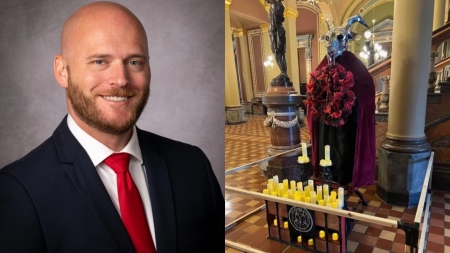Christian veteran who toppled satanic statue files to dismiss hate crime charge

The U.S. Navy veteran who toppled a satanic display in the Iowa state Capitol in December filed a motion last Friday to dismiss the felony hate crime charge against him.
Michael Cassidy's defense attorney Sarah Pasquale also argued in court filings that the charge is inapplicable to his situation because The Satanic Temple is not a real religion, according to the Des Moines Register.
Cassidy, a former Republican candidate for the Mississippi House of Representatives, made headlines on Dec. 14 when he traveled to Des Moines and pushed over a statue of Baphomet that the Iowa chapter of The Satanic Temple had erected near a Nativity scene in the Iowa state Capitol.
The statue, which stood before a candle-lit altar, had prompted debate even among Christian Republican state legislators regarding the limits of free speech and freedom of religion.
When he turned himself into authorities immediately after tossing the Baphomet statue's silver goat head in the trash, Cassidy was initially cited with fourth-degree mischief, a misdemeanor.
In January, the Polk County Attorney's Office enhanced the charge to third-degree criminal mischief in violation of individual rights, which is a Class D felony under Iowa's hate crime statute, according to a Jan. 30 statement.
"Evidence shows the defendant made statements to law enforcement and the public indicating he destroyed the property because of the victim's religion," the Polk County Attorney's Office said at the time.
Pasquale argued that the hate crime charge, which relates to crimes driven by "the person's (victim's) race, color, religion, ancestry, national origin, political affiliation, sex, sexual orientation, age, or disability," is broadly unconstitutional and does not apply to Cassidy because The Satanic Temple is a legal entity that does not possess the characteristics of a person.
"It could never be said, save in Wonderland, that Best Buy is Buddhist," she wrote.
Citing multiple dictionaries, the attorney also argued that for the purposes of the statute, a religion is defined as "a system of faith and worship," and noted that by their own admission, The Satanic Temple is not a theistic religion that worships Satan as an entity.
"[The Temple's] own words establish that it is not a religion within the ordinary meaning of religion, as they have no faith, do not worship, and reject the supernatural," Pasquale argued. "That they call themselves a religion simply does not make it so."
Pasquale further claimed that even were the statute applicable to Cassidy, it would be a violation of free speech guaranteed under the U.S. Constitution and the Iowa state Constitution.
"Because [the hate crime law] in this case seeks to punish Cassidy’s thoughts, it cannot withstand constitutional muster as it violates the First Amendment which protects 'the freedom to think,'" she wrote.
In response to Pasquale's filing, TST co-founder Lucien Greaves on Tuesday tweeted: "Somebody needs to remind this moron of the Hobby Lobby ruling declaring that the shop, as a Christian business, is not obligated to pay for insurance coverage with contraceptive options."
Cassidy, whose case is slated to go to trial in May, has raised more than $130,000 for his legal defense on GiveSendGo.
During an interview with The Christian Post in December, Cassidy suggested he did the right thing and was critical toward Christians who hold that the U.S. Constitution protects satanic displays on government property.
"The people who wrote our Constitution would be shocked to think of defending Satan as consistent with their beliefs when they wrote the laws that govern our nation," he said.
"People start overcomplicating the truth, which is that God is great and should be honored, and the devil is evil and should not be honored," he added. "I think people are tying themselves in knots trying to justify it, and it's really a lot simpler than that."
Public figures such as Florida Gov. Ron DeSantis and Pastor John MacArthur have come to Cassidy's defense.
"You have to take the consequences if you do it, but that was a noble thing to do," MacArthur said last month. "That was something that he felt very deeply in his heart."
"What are they doing having an altar to Satan in a state public building?" MacArthur continued. "That is the offense. The offense isn't that it was removed, the offense is that it was there. But it demonstrates where the culture is, that he gets punished, not the people who set it up."






















